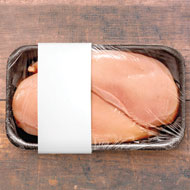
Sir Ian Boyd believes there are no related health problems
Defra chief scientist Sir Ian Boyd says that consumers should be able to choose whether they are allowed to buy chlorinated chicken.
In an interview with Sky News, Sir Ian said that, in terms of health, “there really isn’t a problem with chlorinated chicken”. He believes the problem concerns animal welfare and production processes, “and that is a values-based choice that people need to make.”
“My view is that we need to be allowed to make that choice,” he said. “But it is the job of the people like me to make sure that we explain as clearly as possible what the consequences of different choices are for people.”
Sir Ian also disputed the idea that eating hormone-treated beef may have adverse effects on human health.
“The chances are that most if it will have been metabolised when it comes into the meat you would eat,” he said. “The chances of it having any biological effect on us is almost infinitesimally small.”
Chlorine-washed chicken - washing chicken in chlorinated water to remove harmful bacteria - is banned in the EU. The ban has prevented virtually all US imports of chicken meat treated in this way.
In recent months, however, there has been much discussion about chlorinated chicken and its place in any post-Brexit trade deal with the US. UK farming leaders fear this could lead to the lowering of food production standards.
Speaking to BBC News, National Farmers Union (NFU) president Minette Batters said US farmers could “outcompete” British farmers should any trade deal be reached, and called on the government to provide reassurance to farmers:
"Are we going to hold our nerve or are we going to be sacrificed?" she said. "We need that assurance from the prime minister."
The NFU has called on the Government to enshrine EU regulations on food production in law after Brexit. However, this has not yet been agreed.



 The Veterinary Medicines Directorate (VMD) is inviting applications from veterinary students to attend a one-week extramural studies (EMS) placement in July 2026.
The Veterinary Medicines Directorate (VMD) is inviting applications from veterinary students to attend a one-week extramural studies (EMS) placement in July 2026.